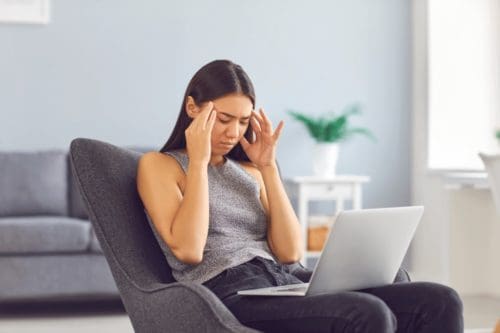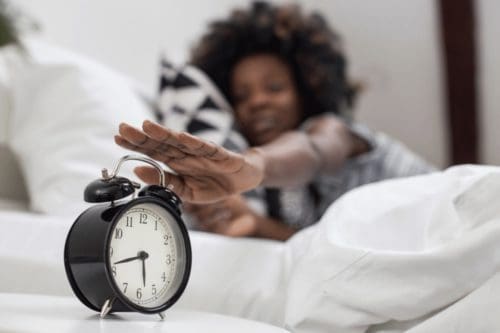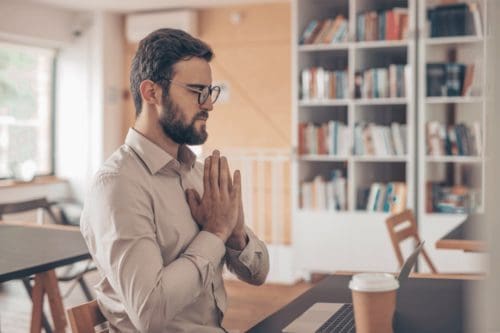May is Better Hearing and Speech Month
Did you know that May is Better Hearing and Speech Month? Several years ago, I had an accident. It was a stupid accident, completely my fault involving a Q-tip. If you are easily grossed...
In this article, we’ll be exploring several ways to combat anxiety when you wake up—including virtual therapy sessions, meditation techniques, and more!

For people who suffer from anxiety, many report that their symptoms are worse in the morning. Morning anxiety can also affect those who have not been diagnosed but who experience infrequent high stress episodes. People who suffer from chronic anxiety may be experiencing symptoms every morning, which can be completely exhausting. Not only that, but morning anxiety affects not just the morning, but the rest of your day—and even your sleep schedule overnight. That’s why we’re going to be breaking down the different steps you can take to minimize anxiety that occurs when you wake up and some overarching strategies—like virtual therapy sessions—that will help your mental health in the long term.
Today, we are going to take a closer look at what causes acute anxiety in the morning, how you can fight anxiety in the moment, and answer the question— “How can I access online therapy options for me?” Let’s get started so you can start feeling your best in the morning and learn about a few strategies to remedy symptoms caused by general anxiety.
Before we start talking about how virtual therapy sessions can help with morning anxiety, let’s define morning anxiety

Morning anxiety makes daily tasks difficult or nearly impossible.
Anxiety is a difficult mental health disorder to manage. It can be even more difficult when your symptoms begin the second you wake up. We all lead busy lifestyles, meaning that morning anxiety will likely affect every task that you need to perform that day. To help you get a better idea of what morning anxiety looks like, we’ve come up with a list of symptoms that have been reported by people who commonly experience morning anxiety.
Though morning anxiety is not limited to these few symptoms, many people will experience one or more of these symptoms when dealing with morning anxiety.Luckily, a lot of these symptoms can be remedied by exploring in-person or virtual therapy sessions, medication, and other solutions like mediation. But first, let’s take a look at a few of the most common causes of anxiety that occurs when you wake up.
When you have the support of virtual therapy sessions, you can voice your worries before they manifest as morning anxiety

Some symptoms of morning anxiety can be traced back to a natural spike in cortisol.
Most people reading this article who experience anxiety symptoms when they wake up all have the same question—“Why is this happening?” There are a few different answers to why people experience symptoms of anxiety in the morning. The first theory we are going to explore is a chemical one.
Stress and anxiety are caused by a stress hormone called cortisol. Our body creates cortisol as a natural defense. When we feel threatened, our body will produce cortisol which prompts our brain to find a solution. You can think of cortisol as an element of our natural “fight or flight” response. When stress hormones are raised in our bodies, we feel like we are under attack. However, we are not under attack in the same way our ancestors were. So, in many cases the natural response is more of a hindrance to our lives as opposed to an asset. For example, if you were being attacked by a bear, an increase in cortisol is beneficial—even essential—to your survival in that situation. But, when your cortisol levels rise in the morning when you have to start work or begin taking care of your children, the chemical makes it more difficult for us to focus and accomplish tasks.
Additionally, the release of cortisol in our brains triggers other stress hormones to be released including adrenaline. When adrenaline is released in the brain it causes an uptick in heart rate and blood pressure. This is another element of our “fight or flight” response where we are filled with energy to either defend ourselves or run from an attacker.
The reason we are talking about chemical stress responses like cortisol and adrenaline is for one of two main reasons. The first reason is that these chemicals are what bring on feelings of stress and anxiety. The second reason is that these chemicals tend to spike in the morning time—even if you don’t have anxiety. When your cortisol levels spike in the morning, it is referred to as a cortisol awakening response, abbreviated as CAR. When you already have underlying symptoms of anxiety, the feelings brought on by CAR can be unbearable. But, your brain chemistry is not the only reason that you experience feelings of anxiety when you wake up. Let’s take a look at a few other factors that may exacerbate anxious thoughts when you wake up in the morning. Plus, we’ll learn how you can use virtual therapy sessions to combat these factors. Let’s dive in!
This might go without saying, but life stressors can compound feelings of anxiety that occur when you wake up in the morning. Often, the first thing that comes to mind in the morning is our daily to-do list. For a lot of people, that may include a high-stress job, family duties, and a whole host of other daily tasks that cause us stress. If you are already experiencing anxiety, then a spike of cortisol and adrenaline in the morning could be enough to cause feelings of fear or dread. If you experience high-stress levels related to everyday tasks, you stand to benefit from regular in-person or virtual therapy sessions to help you get some of those stressful thoughts off of your chest.
Another factor that can cause feelings of intense anxiety when you wake up is substance use. Drugs and alcohol affect our brain chemistry, and in some cases can worsen symptoms of anxiety—especially in the morning. While having a drink or indulging in some other way might quell feelings of anxiety in the moment, you are merely putting off those anxious feelings. Then, when you wake up the next morning on the comedown, these symptoms present themselves more acutely than before. Often, when it comes to using or abusing substances, there are physical as well as mental effects that lead to morning anxiety. Physical symptoms include headache, dehydration, excessive hunger, and general lethargy while mental symptoms include feelings of regret and flashbacks. If you are experiencing symptoms of morning anxiety brought on by substance use or abuse, then you should look for in-person or virtual therapy sessions you can attend to begin working on your relationship with drugs or alcohol. In many cases, talk or group therapy helps individuals who are dealing with dependence or addiction.
>Sometimes, if you are experiencing issues either with your significant other, a family member, or a coworker, these issues will slip into your consciousness right when you wake up. Often, we imagine how we are going to deal with these issues, create scenarios in our heads, or fret about what other people think. Difficulties with your personal or working relationships not only make it more difficult to get going in the mornings but also make it more difficult to fall asleep as well.
In addition to interpersonal issues, there are also pre-existing physical conditions that can cause morning anxiety. People who have existing physical ailments have to visit the doctor more often and have to spend time worrying about things like test results. There are also physical symptoms that will add to anxiety if you suffer from a condition like heart disease, diabetes, hypertension, or asthma. These conditions can all increase feelings of anxiety, which can cause you to wake up with additional stress or will cause you to wake up several times throughout the night. Luckily, talk therapy or virtual therapy sessions can help those with existing physical conditions mentally deal with the side effects and treatment.
Financial insecurity is one of the biggest stressors for many adults. When you wake up, you may find that all of the issues associated with money hit you all at once. For example, you might have worries about paying monthly bills, paying rent, buying groceries, or other outstanding debts like student loans. Worries about financial insecurity often affect even those who do not experience any underlying mental health conditions.
If you have recently begun experiencing acute anxiety when you wake up in the morning, know that it may not be incidental. Morning anxiety could be associated with an underlying mental health condition. Sometimes morning anxiety is an indicator of general anxiety or depression. If you are experiencing morning anxiety daily, there is a good chance that there is an underlying condition that needs to be addressed by a mental health professional. Luckily, finding the right therapist to conduct in-person or virtual therapy sessions is easier than ever before. Remember, if you don’t address your symptoms as they come up, they could worsen over time.
Now that we have learned about the causes of morning anxiety, let’s take a look at a few solutions—like attending a few virtual therapy sessions

Taking a few moments to meditate in the morning helps reduce anxiety.
As we’ve discussed, waking up with anxiety can make your days feel more difficult. That’s why so many people are searching for solutions for their morning anxiety. Once you can wake up without feelings of fear or dread, you can start feeling your best in the morning and all day long. Let’s take a look at a few of the solutions that will help you deal with anxious feelings as they present themselves.
Talking to a therapist is one of the most effective ways that you can curb morning anxiety. Though we have already mentioned how in-person or virtual therapy sessions help you organize and understand your thoughts, we wanted to discuss a bit more in-depth how therapy can help with anxiety in the morning.
Feelings of stress and anxiety tend to build up in our minds if we never take the time to address why we are feeling anxious. When you find a therapist you can trust, you can express your feelings of stress in the morning, describe your thoughts, and detail how these thoughts affect you throughout the day. The more you learn about yourself and how you address your feelings, the more ready you will be to deal with the feelings as they arise.
Everyone knows the old saying—“You are what you eat”—and while that isn’t true in every situation, what you eat can indeed affect how you feel. In the case of anxiety, there are a few foods that you should seek out, and a few you should avoid to curb excessive stress in the morning. Let’s take a look at some anxiety reducing foods that can help you stay calm in the morning:
Incorporating more of these foods into your diet can help rescue overall feelings of stress and anxiety, especially as you wake up in the morning. It is important to note that above all, maintaining a healthy diet decreases overall feelings of anxiety. If you are not currently getting enough nutrients, these deficiencies could be adding to your anxiety. You should only look to the foods listed above if you are already getting the right amount of nutrients to keep yourself healthy.
On the other hand, there are a few foods you should avoid if you are experiencing anxiety in the morning. For example, caffeinated drinks like coffee or other energy drinks will increase anxiety levels in the morning. It is also a good idea to keep your sugar intake low to avoid the anxiety caused by sugar rushes/crashes.
If you haven’t tried breathing exercises to curb anxious thoughts before—you may find that they are surprisingly effective. Mindfulness exercises help you slow down your breathing and your thoughts when you are feeling stressed or panicked. Meditation is a great strategy for when you wake up because you can practice mindfulness without any equipment. So, when the difficult thoughts and feelings begin to bubble up in the morning, you can focus inward on breathing deeply and consistently. If you are having trouble practicing mindfulness, there are free guided meditations and yoga sessions that you can use to get the hang of it.
When you wake up in the morning, it is easy to get caught up in the latest news, emails from work, and happenings on social media. However, this kind of information overload first thing in the morning can cause cortisol levels to spike more than normal, so it’s best to minimize your morning distractions mindfully. It can be especially difficult to internalize negative or shocking news stories perpetuated by our current 24-hour news cycle. Depending on your personal preference, we recommend finding something relaxing to fill at least the first 15 minutes of your day. That means an activity that does not involve staring at a screen like reading or listening to music. The first 15 minutes of your day could be a good time to meditate before getting your day started!
Exercise helps us deal with anxious thoughts in two different ways. First, you are giving your mind a distraction from the thoughts that arise in the morning. Second, you can positively affect your brain chemistry. When you fit more exercise into your morning routine, you will be able to both curb those stressful thoughts and produce positive feelings at the same time. Instead of producing stress chemicals like cortisol and adrenaline, you’ll produce chemicals that minimize anxious feelings like GABA, serotonin, and certain types of endocannabinoids. These chemicals can help your brain relax and address your daily tasks without excessive stress.
Now that you have a few different resources for stress relief in mind, it is time to put our strategies to the test! While not every strategy will work for everyone, they are all proven to decrease feelings of stress and anxiety. If you are experiencing excessive stress and anxiety, we recommend consulting a professional for help. Attending an in-person or a virtual therapy session could be the key to start feeling your best. Often, we are unable to properly explore our thoughts on our own, which is why therapy is beneficial for so many individuals. If you aren’t sure how to get started with in-person or virtual therapy sessions, we recommend contacting your primary care physician for assistance.
We hope that our suggestions give you a few handy tools to start waking up each morning refreshed, excited, and ready for whatever the day may bring!
Pingback: Guide to Life Insurance Money Protect Family Divine Lifestyle
Pingback: What Occurs When People Experience Unpleasant Stressors
Pingback: Natural Ways To Overcome Anxiety Divine Lifestyle
Pingback: Social Anxiety vs Generalized Anxiety Why am I Always Tense?
Pingback: Overcoming Shyness and Social Anxiety